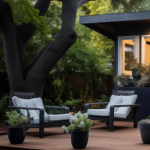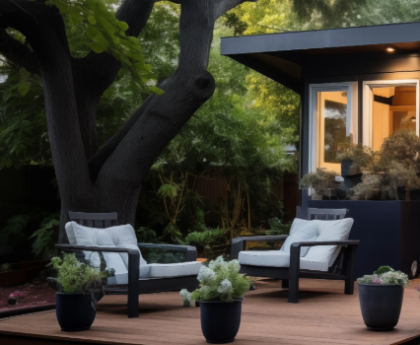
Because they usually require less regulation and review to build, some parts of California are experiencing a boom — about one in six of all new units permitted in the state are ADUs.
These dwellings are particularly popular in San Diego because of the city’s unique rule that lets landlords construct a second “bonus” ADU unit for every one that they build, as long as the first unit is set aside for lower-income tenants. In parts of the city without nearby public transportation, one property can have as many as five units. And while there are some limitations, for landlords that have property in “transit priority” areas, they can build affordable and bonus ADUs many times over.
This has led to ambitious ADU projects in San Diego — with some units constructed on top of each other and resembling full-fledged apartment complexes rather than bespoke cottages or traditional “granny flats.” To date, the largest proposed project in the city includes 148 units.
There is talk about building lots more ADUs across the state. But critics are concerned that landlords aren’t truly making them affordable. They also argue that the dwellings change the character of neighborhoods and are wary of the casual regulatory approach to ADUs. As one co-founder of a San Diego neighborhood group put it, “Don’t call them ‘accessory’ if they’re dominant.”
For more on how ADUs are shaping the state’s housing market, read Ben’s story.
Speaking of the housing crisis: Gov. Gavin Newsom announced Monday that the state will be giving nearly $300 million in grants towards moving about 10,000 unhoused people from encampments into shelters.
Half the money will go towards local efforts — matching funds of local and private, nonprofit contributions — and can be spent at their discretion, such as going towards subsidized housing or support services. The other half will go to state projects, namely to support CalTrans as it works to clear out homeless encampments across the state.
- Newsom, during the press conference: “The public has had it. They’re fed up, I’m fed up, we’re all fed up. And people are dying, they’re suffering on the streets, on sidewalks. So we have to move and that means we have to move with ideas, not just idealism.”
Support CalMatters: It’s Giving Tuesday, which means it’s a good day to support nonpartisan, nonprofit journalism. You can donate here, and it’ll be matched dollar for dollar.
Other Stories You Should Know
Giving without getting scammed

After shopping-centric Black Friday and Cyber Monday comes Giving Tuesday — a day when people can assuage their consumerist guilt and spend some of their disposable income to help various causes, charities and volunteering programs.
(Mildly fun fact: Giving Tuesday started more than 10 years ago at a historic community center in New York.)
To commemorate the day, state Attorney General Rob Bonta and his staff volunteered at the Downtown Women’s Center in Los Angeles on Monday. He also held a press conference to remind people to donate smartly and avoid holiday scams.
- Bonta: “Before writing a check, pulling out your credit card or opening PayPal, make sure you do your due diligence to protect yourself from those who might try to take advantage of your generosity…. We’ve learned a thing or two about scams and frauds over the years — things we’d rather not have seen but we have to face reality and not be naive.”
A few donating tips, according to Bonta:
- Charities that ask for donations in California are required to register with the state, so be sure to check their registration status. (And as a personal tip, you can also review Charity Navigator to check a nonprofit’s track record of actually helping people.)
- Don’t fall for aggressive telemarketers who pressure you into donating, and double-check websites if you’re donating online. Some sites disguised as legitimate charity organizations seek to steal your personal information.
- If you have an issue with a charity or fundraising organization, you can submit a report to the Attorney General’s office.
In a corresponding press release, Bonta’s office also warned charities that “engage in fraudulent fundraising practices” are liable to be investigated and penalized.
Presidential primary has different rules

California’s March 5 primary is a little more than three months away, so the Secretary of State’s office has published its draft official voter information guide.
Through Dec. 11, you have the chance to give feedback on the guide, which includes information on what’s on the ballot, plus statements from six political parties and many candidates (for both the full and unexpired U.S. Senate terms).
But here’s one election fact that’s a little difficult to find: You can’t vote in the Republican primary for president unless you’re registered with the GOP.
The state party has a “closed” presidential primary on Super Tuesday, which means the 22% of California voters who are registered with no party preference can’t participate. (As of October, Republicans comprised 24% of registered voters and Democrats 47%.)
That’s another reason that, barring some insurmountable legal hurdle, former President Donald Trump is the odds-on favorite. The state party has already greased the skids for Trump, changing the rules so that he only needs 50% plus one vote statewide to win all 169 California delegates to the Republican National Convention.
The Green and Peace and Freedom parties also hold closed presidential primaries.
On the Democratic side, unaffiliated voters are welcome in a primary where President Biden is seeking reelection and is expected to sail to renomination, barring unforeseen events. The American Independent and Libertarian parties also allow no party preference voters. But you have to request a ballot that includes the presidential race.
Under California’s top-two primary, the U.S. Senate, congressional and legislative races are open to all voters. And the top two finishers, regardless of party, move on to the November general election.
CalMatters Commentary
CalMatters columnist Dan Walters: While regulating consumer prices can protect the public, it can also boost the finances of big companies.
Gov. Newsom vetoed a bill to require public schools to give free condoms to students, but that access is crucial for contraceptive equity and to prevent sexually transmitted diseases, write Ria Babaria, a UCLA student and legislative director at Generation Up, and Martin Orea, a high school senior and youth ambassador with the YHES 4 Condoms Campaign.




